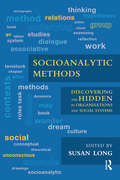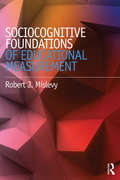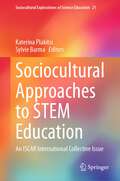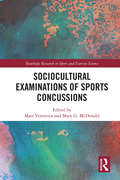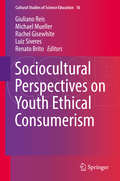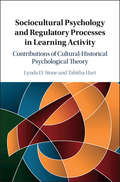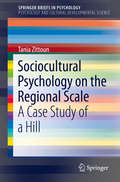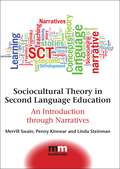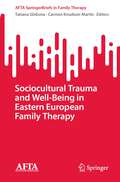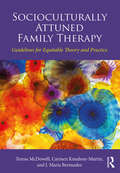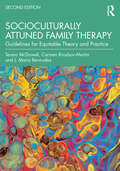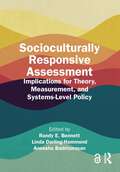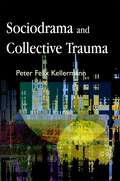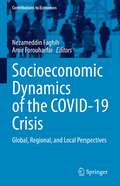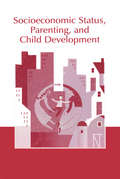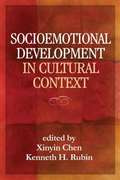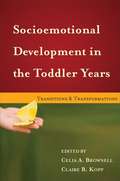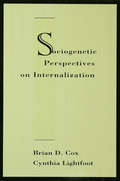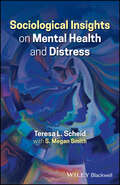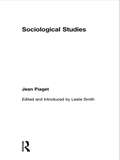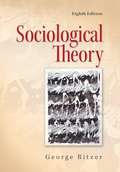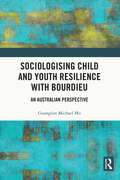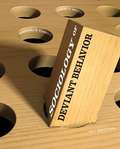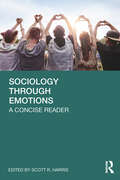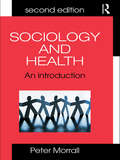- Table View
- List View
Socioanalytic Methods: Discovering the Hidden in Organisations and Social Systems
by Susan LongSocioanalysis is the study of groups, organisations, and society using a systems psychoanalytic framework: looking beneath the surface (and the obvious) to see the underlying dynamics and how these dynamics are interconnected. This book examines several of the methodologies used in socioanalytic work. Even though the beginnings of socioanalytic investigation lay in the mid-twentieth century, a broad look across several methodologies has not been done before, despite separate publications dealing with particular methods. In addition, several new methods have been developed in recent years, which the present work incorporates. Connecting all these methods is their aim of 'tapping into' the dynamic operation of what the author calls 'the associative unconscious' within and between social systems. The associative unconscious is the unconscious at a systemic level. Each of the methods discussed in this book accesses the associative unconscious in different ways.
Sociocognitive Foundations of Educational Measurement
by Robert J. MislevySeveral key developments challenge the field of educational measurement today: demands for tests at larger scales with higher stakes, an improved understanding of how people develop capabilities, and new technologies for interactive digital assessments. Sociocognitive Foundations of Educational Measurement integrates new developments in educational measurement and educational psychology in order to provide researchers, testing professionals, and students with an innovative sociocognitive perspective on assessment. This comprehensive volume begins with a broad explanation of the sociocognitive perspective and the foundations of assessment, then provides a series of focused applications to major topics such as assessment arguments, validity, fairness, interactive assessment, and a conception of "measurement" in educational assessment. Classical test theory, item response theory, categorical models, mixture models, cognitive diagnosis models, and Bayesian networks are explored from the resulting perspective. Ideal for specialists in these areas, graduate students, developers, and scholars in both educational measurement and fields that contribute to a sociocognitive perspective, this book consolidates nearly a decade of research into a fresh perspective on educational measurement.
Sociocultural Approaches to STEM Education: An ISCAR International Collective Issue (Sociocultural Explorations of Science Education #21)
by Katerina Plakitsi Sylvie BarmaThis book is a contribution to the sociocultural approaches to Science Technology Engineering and Mathematics (STEM) Education. It offers a new interpreting theoretical framework coming from the Cultural Historical Psychology. The authors highlight some serious elements of the sociocultural context that mediates learning on STEM or with STEM adds. The book brings together the work of researchers interested in developmental psychology and childhood, with a special focus on using Activity theory and Cultural-historical research approach to unite these two opposing approaches to the study of children. The authors reconsider our relationship and experiencing with technology. It moves the attention from the pure instrumental aspect of technology to a deep human and societal approach. Moreover, the book focuses on the issue of teachers' continuing education in both formal and informal settings is being seen under a sequential system of expansive cycles and the key role of contradictions in transformative educational settings. Overall, this book encourages the academic society to open dialogue with other societies and enhance interdisciplinary research in times of crisis.
Sociocultural Examinations of Sports Concussions (Routledge Research in Sport and Exercise Science)
by Matt Ventresca Mary G. McDonaldSport’s "concussion crisis" has been characterized by controversial scientific discoveries, athlete suicides, and high-profile lawsuits involving professional sports leagues, while provoking widespread media coverage, changes to game rules, and debate about the future of many popular sports. Sociocultural Examinations of Sports Concussion is the first edited collection to bring together multiple sociocultural perspectives on sports concussion that interrogate the social, economic, political, and historical forces shaping the cultural impacts of these injuries. Each of the ten chapters moves beyond biomedical or neuroscientific paradigms to critically examine a specific intersection of sociocultural factors influencing public perceptions about concussion or athlete experiences of brain injury. These include analyses of media and advertising, medical treatment and diagnostic protocols, gender and masculinity, developments in equipment and scientific models, economics and labor politics, understandings of trauma and recovery, public health philosophies, and disciplinary differences in framing the ontologies of concussion. Drawing from a wide range of theoretical and methodological approaches, Sociocultural Examinations of Sports Concussion offers a diverse set of analyses examining brain injuries as cultural and embodied phenomena affecting more than just athletes’ brains, but also embedded within and (re)shaping meanings, identities, and social contexts. It is valuable reading for graduate students and researchers interested in the experience and treatment of sports concussion, sports sociology, and sports technology.
Sociocultural Perspectives on Youth Ethical Consumerism
by Giuliano Reis Michael Mueller Rachel Gisewhite Luiz Siveres Renato BritoThis exciting new book advances current practice-based and theoretical knowledge around how youth defines and engages with consumerism to provoke a larger conversation within science and environmental education. It is also geared towards unveiling those literacy praxes that can assist youth to adopt more ethically-oriented consumerist habits. More specifically, this book studies how youth's participation in the global consumer market intersects with media technologies, new literacies, as well as science and the environment from sociocultural perspectives. In addition, it considers how school science has mediated youth participation in hyper-consumerism, from food and technology to shelter and transportation. This important and timely book is a must-read for those interested in topics such as critical youth studies, critical media literacy, STEM, arts-based research, STSE education, citizenship education, cultural studies, policy studies, curriculum studies, socio-scientific issues, technology, sustainability, food studies, social justice, poverty, and consumer behaviour. A wide range of science, technology and environmental educators from Australia, Brazil, Canada, Netherlands and the United States have combined their perspectives to produce this exciting, innovative, timely and important book. It should be essential reading for all teachers, teacher educators and curriculum developers keen to address key issues raised by a commitment to assist students in refining their understanding of what constitutes socially, culturally, ethically and politically responsible consumer practices and supporting them in formulating and engaging in effective individual and collective action. Derek Hodson, Emeritus Professor of Science Education, Ontario Institute for Studies in Education (OISE), University of Toronto, Professor of Science Education at The University of Auckland (New Zealand), and Founding Editor of the Canadian Journal of Science, Mathematics and Technology Education (CJSMTE). The authors in the book deconstruct and analyse intricate economic, sociopolitical and affective networks that are behind the cycles of production, distribution and consumption of objects that are present in youngsters' daily lives and their attitudes towards them. Apart from breaking new ground by proposing and discussing socioculturally informed research about the topic, the book connects with pedagogical approaches that value critical perspectives on the nature of the relationship between science, technology, society and environment. It is a must-read for both researchers and practitioners interested in issues related to sustainability and citizenship education. Isabel Martins, Professor of Science Education, Universidade Federal do Rio de Janeiro/ Federal University of Rio de Janeiro (UFRJ).
Sociocultural Psychology and Regulatory Processes in Learning Activity: Contributions of Cultural-Historical Psychological Theory
by Lynda D. Stone Tabitha HartWritten by educational researchers and professionals working with children and adolescents in and out of school, this book shows how self-regulation involves more than an isolated individual's ability to control their thoughts and feelings, particularly in a learning environment. By using Vygotsky's cultural-historical psychological theory, the authors provide a unique set of four analytical lenses for a better understanding of how self-regulation, co-regulation, and other-regulation function as a system of regulatory processes. These lenses move beyond a focus on solitary individuals, who self-regulate behavior, to centre on individuals as relational, agential, and contextually situated. As agents, teachers and their students build their learning contexts and are influenced by these self-engineered contexts. This is a dynamic perspective of a social context and underlies the view that regulatory processes are an integral part of a functional system for learning.
Sociocultural Psychology on the Regional Scale: A Case Study of a Hill (SpringerBriefs in Psychology)
by Tania ZittounThis brief presents the case study of a hill in Czech Republic (Říp) and its region, and contributes to theorization in sociocultural psychology on three points, along three current debates. First, it contributes to the exploration of the mutual constitution of the lifecourse and of history, uses a distinction between socio-, micro- and ontogenesis, and argues that a focus on a delimited geographical space enables to better observe the processes by which history, daily situated interactions and courses of life shape each other. Second, in doing so, it sketches an understanding of the role of the material, spatial and semiotic specificities of landscapes in human development. Especially, it identifies some of the processes by which redundant dynamic patterns present in the environment may participate to the guidance of human experience. Third, it expands the reflection on case study construction and generalization. On the one side, it participates to a current debate in cultural psychology on the dynamics of generalization from single cases; on the other, it also dialogues with a more general reflection in the social sciences on social dynamics at the scale of small regions. Altogether, this brief is a first attempt to examine jointly these questions at the scale of a small region, a unique natural laboratory of social and psychological change. It will be of interest to researchers as well as graduate students in the fields of cultural and sociocultural psychology, cognitive psychology, and the social sciences.
Sociocultural Theory in Second Language Education: An Introduction Through Narratives
by Merrill Swain Penny Kinnear Linda SteinmanIn this accessible introduction to Vygotskyian sociocultural theory, narratives illuminate key concepts of the theory. Intended for graduate and undergraduate audiences, this textbook includes controversies in the field, questions for collaborative discussion and provides references to important work in the literature of second language teaching, learning and research.
Sociocultural Trauma and Well-Being in Eastern European Family Therapy (AFTA SpringerBriefs in Family Therapy)
by Carmen Knudson-Martin Tatiana GlebovaThis book examines the effects of sociocultural trauma throughout the 20th century on interpersonal and family relationships in five Eastern European countries, drawing on the perspectives of mental health practitioners. Chapters employ a systemic perspective to explore the unique social, political, and cultural contexts that influence relationships in each country with a particular focus on implications for psychological and relational well-being. The volume demonstrates the importance of examining the cultural and sociocontextual nuances and complexity that may influence the impact of historical events on relationships, elucidating similarities and differences among countries in how the collective trauma has influenced them. It assists family therapists and other mental health practitioners in recognizing cultural and social factors that may influence their work with families, individuals, or couples living in these countries or who have immigrated from them.Key areas of coverage include:Descriptions of each country’s experience of sociocultural trauma and the current social-cultural-economic-political contexts.Impact of trauma on interpersonal relationships across various social locations and national and ethnic identities within the existing borders.Current challenges, recommendations for clinical practice, and future directions for research and practice. Sociocultural Trauma and Well-Being in Eastern European Family Therapy is an essential resource for clinicians, therapists, and practitioners as well as researchers, professors, and graduate students in family studies, clinical psychology, and public health as well as all interrelated disciplines.
Socioculturally Attuned Family Therapy: Guidelines for Equitable Theory and Practice
by Carmen Knudson-Martin Teresa McDowell J. Maria BermudezSocioculturally Attuned Family Therapy addresses the need for socially responsible couple, marriage, and family therapy that infuses diversity, equity, and inclusion throughout theory and clinical practice. The text begins with a discussion of societal systems, diversity, and socially just practice. The authors then integrate principles of societal context, power, and equity into the core concepts of ten major family therapy models, paying close attention to the "how to’s" of change processes through a highly diverse range of case examples. The text concludes with descriptions of integrative, equity-based family therapy guidelines that clinicians can apply to their practice.
Socioculturally Attuned Family Therapy: Guidelines for Equitable Theory and Practice
by Carmen Knudson-Martin Teresa McDowell J. Maria BermudezSocioculturally Attuned Family Therapy, 2nd edition, is a fully updated and essential textbook that addresses the need for marriage and family therapists to provide socially responsible couple, marriage, and family therapy, infusing diversity, equity, and inclusion throughout theory and clinical practice. Written accessibly by leaders in the field, this new edition explores why sociocultural attunement and equity matter and provides students and clinicians with integrative, equity-based family therapy guidelines that clinicians can apply to their practice. The authors integrate principles of societal context, power, and equity into the core concepts of ten major family therapy models, such as structural family therapy, narrative family therapy, and Bowen family systems, with this new edition including a new chapter on socio-emotional relational therapy in practice. Paying close attention to the "how to’s" of changes processes, updates include the use of more diverse voices that describe the creative application of this framework, the use of reflective questions that can be used in class, and revisions to show how the authors have moved their thinking forward, such as third-order thinking vs change, ethics as infused in everyday practice from a third-order perspective, and the limits and applicability of SCARFT as a transtheoretical, transnational approach. Fitting COAMFT, COACRE, and CSWE requirements for social and cultural diversity, this new edition is revised to include current cultural and societal changes, such as the BLM movement. It is an essential textbook for students of marriage and family therapy and is important reading for family therapists, supervisors, counsellors, and social workers.
Socioculturally Responsive Assessment: Implications for Theory, Measurement, and Systems-Level Policy
by Linda Darling-Hammond Randy E. Bennett Aneesha BadrinarayanSocioculturally Responsive Assessment assembles the best-available thinking from within and outside the educational measurement community about the theoretical foundations and systems-level policy implications of formal assessment programs designed to be socioculturally responsive. Synthesized from culturally responsive assessment design and practices, culturally relevant pedagogy and funds of knowledge, universal design for learning, the learning sciences, and other literatures, this emerging concept affirms that students’ learning and performance is inextricably tied to the social, cultural, and linguistic contexts in which they live and develop knowledge. Across four sections, this book provides an argument and initial evidence for impact on students, users, and assessment quality; offers guidance for implementation; and examines the potential limitations, pitfalls, barriers, and measurement issues that such programs will inevitably raise. Scholars, teaching faculty, test developers, and policymakers will come away with integral foundations, new assessment approaches, and a greater sense of the potential for positive impact that these assessments may afford.
Sociodrama and Collective Trauma
by Peter Felix KellermannTime does not heal all wounds: decades after a disaster, entire communities may still experience the long-term effects of trauma. Sociodrama and Collective Trauma examines the psychological and social damage of trauma to society as a whole. Kellermann argues that collective trauma has been insufficiently considered; his timely book suggests practical ways of facilitating the rehabilitation of survivors of collective trauma through, for example, sociodrama and related group work. The author develops methods for understanding the past and preparing for the future and provides a wealth of case studies based on 30 years' experience of treating survivors of war trauma and other forms of disaster. Combining a systematic theoretical approach with a practical methodology, this insightful book is invaluable for drama therapists, group therapists, mental health professionals and counsellors.
Socioeconomic Dynamics of the COVID-19 Crisis: Global, Regional, and Local Perspectives (Contributions to Economics)
by Nezameddin Faghih Amir ForouharfarThis book depicts and reveals the socioeconomic dynamics of the COVID-19 crisis, and its global, regional, and local perspectives. Explicitly interdisciplinary, this volume embraces a wide spectrum of topics across economics, business, public management, psychology, and public health. Written by global experts, each chapter offers a snapshot of an emerging aspect of the COVID-19 crisis for the benefit of academics and students, as well as the institutional, economic, social, and developmental policymakers and health practitioners on the ground.
Socioeconomic Status, Parenting, and Child Development (Monographs in Parenting Series)
by Marc H. Bornstein Robert H. BradleySocioeconomic Status, Parenting, and Child Development presents cutting-edge thinking and research on linkages among socioeconomic status, parenting, and child development. The contributors represent an array of different disciplines, and approach the issues from a variety of perspectives. Accordingly, their "take" on how SES matters in the lives of children varies. This volume is divided into two parts. Part I concerns the constructs and measurement of SES and Part II discusses the functions and effects of SES. Each part presents four substantive chapters on the topic followed by an interpretive and constructively critical commentary. The chapters--considered as a whole--attest to the value of systematically examining the components of SES and how each flows through an array of specific parenting practices and resources both within and outside the home environment to help shape the course of child development. The result is a more fully delineated picture of how SES impacts the lives of children in the 21st century--a picture that contains a road map for the next generation of studies of SES and its role in the rapidly evolving ecology of family life.
Socioemotional Development in Cultural Context
by Kenneth Rubin Xinyin ChenFilling a significant gap in the literature, this book examines the impact of culture on the social behaviors, emotions, and relationships of children around the world. It also explores cultural differences in what is seen as adaptive or maladaptive development. Eminent scholars discuss major theoretical perspectives on culture and development and present cutting-edge research findings. The volume addresses key aspects of socioemotional functioning, including emotional expressivity, parent-child and peer relationships, autonomy, self-regulation, intergroup attitudes, and aggression. Implications for culturally informed intervention and prevention are highlighted
Socioemotional Development in the Toddler Years
by Claire Kopp Celia BrownellThis volume explores the key developmental transitions that take place as 1- to 3-year-olds leave infancy behind and begin to develop the social and emotional knowledge, skills, and regulatory abilities of early childhood. Leading investigators examine the multiple interacting factors that lead to socioemotional competence in this pivotal period, covering both typical and atypical development. Presented is innovative research that has yielded compelling insights into toddlers' relationships, emotions, play, communication, prosocial behavior, self-control, autonomy, and attempts to understand themselves and others. The final chapter presents a systematic framework for socioemotional assessment.
Sociogenetic Perspectives on Internalization
by Cynthia Lightfoot Brian D. CoxThe issue of how the external world becomes part of the behavioral repertoire of children has been important to psychology from its very beginning, preoccupying theorists from Sigmund Freud to George Herbert Mead. But ever since Lev Vygotsky claimed that every function in a child's activity appears first as a process in the social realm between individuals and moves to a process that individual children can accomplish relatively independently, there has been increased debate as to exactly how this process of internalization happens. In contemporary developmental psychology, the process of internalization has become so important that the time is ripe for a book which explicitly addresses the problems it poses. Although the chapters in this book deal with age groups from preschool to adolescence, and topics from mathematics to storytelling and from taking risks to making moral judgments, there is one core question which unifies them all: If the growing competence of a child is truly sociogenetic, if it truly grows out from, is supported by, and is dependent upon the social, where is that competence truly located? Bearing a variety of labels--cultural-historical, co-constructionist, dialectical, contextualist, narrative, hermeneutic, and discursive psychologies--and analytic constructs--scaffolding, proleptic instruction, participation, appropriation, and situated activity--contemporary perspectives are showing clear signs of development and differentiation. This volume's goal is to help bring some order to these differences, without denying either the usefulness of this variety or the importance of the differences among perspectives. This new book illuminates these differences by collecting a select sample of theory and research into one of two major sections. The first section includes work undertaken from a social interactive perspective. The overarching aim is to identify processes of child-child or child-adult interactions as they emerge over relatively short periods of time. Typically, the methodology involves the microanalysis of videotaped interactions. Development is situated literally within social interactions which are considered directly responsible for children's development. The second section provides a sample of work representing a symbolic action perspective. This one is not oriented toward social interactions but toward the symbolic meanings that they express and that children impose on them. The dominant methodology is interpretive or hermeneutic, and the goal is to articulate the figurative (metaphoric) processes and narrative structures that inhabit social actions and from which they draw their meaning and coherence.
Sociological Insights on Mental Health and Distress
by Teresa L. Scheid S. Megan SmithIntroduces students to the study of the social forces that shape mental health and empowers the next generation to make an impact on mental health management As the prevalence of mental health issues worldwide continues to grow, an active area of sociology is investigating the social causes and consequences of mental health and illness. Young people are especially vulnerable to the current mental health crisis—they are more frequently experiencing social isolation, family stressors, difficulties establishing social relationships, and heightened levels of anxiety, depression, loneliness, and suicidal thoughts. Using a relatable and accessible narrative style, Sociological Insights on Mental Health and Distress helps students understand the connections between mental health issues and their social and structural determinants. Integrating classical and contemporary sociological theory, this concise textbook examines mental health from four key sociological perspectives: social context, social integration, stress, and stigma. Special emphasis is placed on the role of social media and cyberbullying in mental health concerns, global sources of anxiety such as COVID-19 and climate change, and emerging topics including neuro-divergencies in mental health problems and suicide in LGBTQ+ and BIPOC communities. Supported by a wealth of pedagogical tools and an extensive companion website, Sociological Insights on Mental Health and Distress is the perfect textbook for undergraduate courses in the sociology of mental health, health and illness, psychological and sociological deviance, and social problems, as well as interdisciplinary courses in criminal justice, public health, social work, and psychology.
Sociological Studies
by Jean PiagetJean Piaget is one of the greatest names in psychology. A knowledge of his ideas is essential for all in psychology and education. Sociological Studies is one of his major works to remain untranslated. Now an international team of Piaget experts has got together to ensure that this important work is available in English. This classic text, exploring the role of social experience in the development of understanding, shows the general perception of Piaget as someone who took insufficient account of social factors in psychology to be false.
Sociological Theory (8th Edition)
by George RitzerThis text gives readers a comprehensive overview of the major theorists and schools of sociological thought. The integration of key theories with biographical sketches of theorists and the requisite historical and intellectual context helps students to better understand the original works of classical and modern theorists as well as to compare and contrast the latest substantive theories.
Sociologising Child and Youth Resilience with Bourdieu: An Australian Perspective
by Guanglun Michael MuIn this book, Mu crafts a sociology of resilience through his multi-year research with Australian students. The content is not merely concerned with individual achievements in precarious conditions but also ponders over transformative, reflexive, and power-rejective everyday practices that make social change possible, probable, and even inevitable. Since Emmy Werner and her colleagues discovered the "self-righting" and "invincible" children on the Hawaiian island of Kauai who fared well despite exposure to significant household risks, positive psychology has markedly advanced the knowledge about child and youth resilience to adversities. Yet, many children and adolescents continue to slide through system cracks. This fact does not invalidate psychology of resilience; rather, it urges new frameworks to break the reproductive circle of inequality. Reframing the traditional psychological notion of resilience through recourse to Bourdieu’s relational and reflexive sociology, the book moves beyond individual adaptation to adverse conditions and takes a deep dive into sociological resilience to structural problems. It offers school professionals and educational researchers an epistemological tool to reapproach resilience and reappropriate Bourdieu for social change. Offering scholarship that will interest researchers in the areas of child and youth resilience, sociology of resilience, and sociology of education, the volume is written to engage with the intellectual work of both established scholars and emerging researchers within Australia and beyond. The empirical analyses also provide useful insights for educational professionals in schools and resilience researchers in universities.
Sociology Of Deviant Behavior
by Robert Meier Marshall ClinardSOCIOLOGY OF DEVIANT BEHAVIOR has been the market-leading deviance/criminology textbook for more than 40 years by combining timely research findings and updated data with solid sociological analysis. Designed to appeal to today's students, the fifteenth edition examines such relevant and timely topics as justified deviance (e.g., terrorism); corporate crime and mistakes, such as the General Motors ignition problem; the changing moral landscape regarding gay marriage and marijuana use; the importance of social media in facilitating deviant acts; political crime, including electoral crime; and cultural and social reactions to deviance. Learning aids-such as chapter outlines, bolded key terms, discussion questions, and a glossary-support students' study and review.
Sociology Through Emotions: A Concise Reader
by Scott R. HarrisOffering an accessible and intriguing look at emotions in society, Sociology Through Emotions collects together contemporary qualitative research that illuminates many of sociology’s central concepts and topics, from culture, socialization, and inequality to family, crime, healthcare, religion, and social movements.This book appeals to instructors who want to highlight the social factors that shape emotions as well as the impact of emotions on social life. It is an attractive supplement for courses on introduction to sociology, self and society, social psychology, and others focused on interaction, culture, and meaning making.
Sociology and Health: An Introduction
by Peter MorrallThis lively, introductory text provides students and health practitioners with the foundations of a sociological understanding of health issues. Written for anyone who is interested in health and disease in contemporary global society, this book engages the reader to act upon their occupational and moral responsibilities. It explains the key sociological theories and debates with humour and imagination in a way that will encourage an inquisitive and reflective approach on the part of any student who engages with the text. With individual chapters covering sociology, health, science, power, medicalisation, madness happiness, sex, violence and death, Sociology and Health is organized so that the student moves through sociological approaches and themes which constantly recur in the experience of healthcare. Students will find this a readable and controversial text which covers the ground they need to know in a thought-provoking way. Lecturers will find it a helpful text for generating discussion in tutorials and seminars. There are summaries at the end of each chapter, suggestions for further reading and ideas for the reader.
